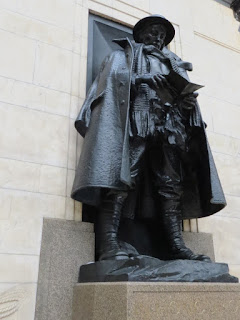Requiem for the Croppies - Seamus Heaney
The pockets of our greatcoats full of barley... No kitchens on the run, no striking camp... We moved quick and sudden in our own country. The priest lay behind ditches with the tramp. A people hardly marching... on the hike... We found new tactics happening each day: We'd cut through reins and rider with the pike And stampede cattle into infantry, Then retreat through hedges where cavalry must be thrown. Until... on Vinegar Hill... the final conclave. Terraced thousands died, shaking scythes at cannon. The hillside blushed, soaked in our broken wave. They buried us without shroud or coffin And in August... the barley grew up out of our grave.
